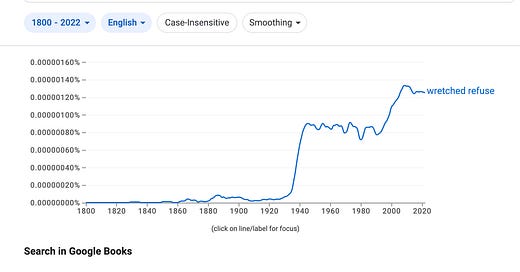Wretched Refuse: Why nobody noticed the Huddled Masses poem until 1938
Rather than being a foundational document, Emma Lazarus's "New Colossus" was unknown until 162 years after 1776.
With immigration policy being a big issue in America’s 2024 election, just as it has recently been a big issue in other democratic countries around the world, the Democrats are running on the idea that for an American voter to question immigration is, you know, weird.
After all, doesn’t Emma Lazarus’s poem “The New Colossus” about the huddled masses of wretched refuse reflect the bedrock American value of Open Borders going back to 1776?
Consider the number of books published that include the phrase “wretched refuse,” which Lazarus didn’t quite make up but is clearly only associated with her. You have to be pretty deep into the immigration cult, as so many are today, to think importing “the wretched refuse” sounds like a self-evidently smart idea:
In reality, contra the 21st Century conventional wisdom that Emma Lazarus was a Founding Fatheress and her “The New Colossus” supersedes obsolete documents like the Preamble to the Constitution, with its deplorably nativist (but fortunately forgotten) statement that the point of the Constitution is to benefit “ourselves and our posterity,” practically nobody in the United States had ever heard of Lazarus’s poem until 55 years after it was published.
Google’s Ngram is very useful for this kind of historical deep dive into the influence of Lazarus’ 1883 poem. (See above.)
Keep reading with a 7-day free trial
Subscribe to Steve Sailer to keep reading this post and get 7 days of free access to the full post archives.




